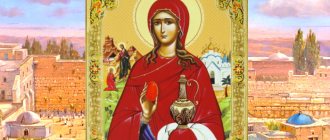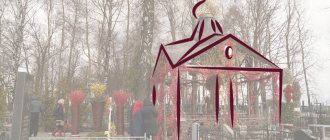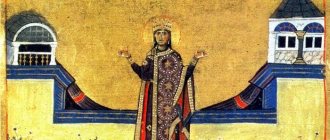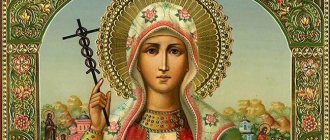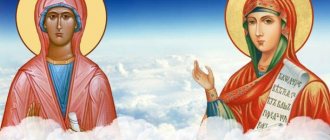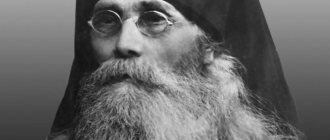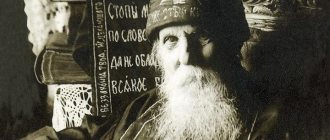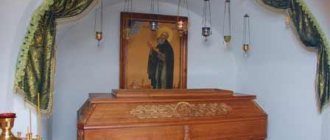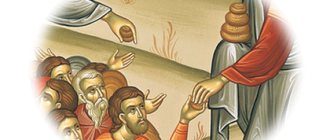| Archimandrite Gabriel (Urgebadze) |
Gabriel (Urgebadze) of Samtavria
(Georgian არქიმანდრიტი გაბრიელი; 1929 - 1995), archimandrite, holy confessor, holy fool for Christ's sake Memory October 20
In the world, Urgebadze Goderdzi Vasilievich, was born on August 26, 1929 in the city of Tbilisi, Transcaucasian Soviet Federative Socialist Republic as part of the USSR, in the family of a convinced communist. Goderdzi was about two years old when his father, Vasily Urgebadze, was killed under unknown circumstances. After this, family members began to call Goderzi after him - Vasiko. He had a brother and two sisters.
He was baptized in infancy and believed in God as a child. One day the neighbors were arguing, and one of them said: “ You crucified me like Christ.”
". The boy became interested in what it means to “crucify” and who Christ is. The adults sent the child to church, where the watchman advised him to read the Gospel. He saved up money, bought the Gospel and after a few years knew the text practically by heart.
He studied at Tbilisi school No. 24 for six years; He studied the Gospel at Zion Cathedral.
The desire for monasticism arose in him in his youth. Later the elder said: “ There is no greater heroism than monasticism.”
". For a long time, the mother was against her son’s desire for monasticism, but at the end of her life she came to terms with his choice, and then she herself took monastic vows with the name Anna and was buried in the Samtavro Monastery (+ April 26, 2000).
In 1949, Vasiko was drafted into the army. He served in military service in Batumi, in the border unit. Despite the strict regime, he observed fasting and secretly attended church. Returning home, Vasiko built himself a small dwelling in the courtyard of the house, where he labored alone and went to services at the Zion Cathedral.
| Hieromonk Gabriel (Urgebadze). Photos from 1955-1965. |
In the early 1950s, Vasiko began working as a watchman, and then served as a psalm-reader in the Zion Cathedral.
On January 1, 1955, he was appointed his refector and day caretaker. On January 30, 1955, he was ordained a deacon and was appointed to the Kutaisi Church of the Holy Apostles Peter and Paul, on February 27, he was tonsured a monk by Bishop Gabriel (Chachanidze) in the Kutaisi Motsameta Monastery, and three days later he was ordained a hieromonk in the Peter and Paul Cathedral and appointed second priest.
He chose the monastic name for himself; he was named in honor of St. Gabriel of Athos, an elder who walked on the water and brought the Iveron Icon of the Mother of God, which had sailed across the sea, to the Athos shore. Father Gabriel especially revered the miraculous list of Iverskaya, kept in the Samtavro monastery.
In January 1956, he refused to serve and was banned, but in October of the same year the ban was lifted.
He served first in Sioni, and from 1960 - in the Betania monastery.
At the end of 1962, the authorities closed Betania, and the elder returned to Tbilisi, where he built a multi-domed church in his backyard on Tetritskaroskaya Street in Tbilisi. He built it with his own hands and finished it around 1962. The Soviet authorities repeatedly destroyed this temple, but Father Gabriel restored it again and again. Father Gabriel found icons for this church in city dumps, where in those years numerous holy objects were taken and thrown away along with garbage. Sometimes he wandered around the dumps for days on end. He had a small workshop where he cleaned icons and made frames for them from various materials. The walls of his church were completely covered with images. He even framed photographs and images of icons from secular magazines. This church has survived to this day.
| Archimandrite Gabriel (Urgebadze) |
On May 1, 1965, during a demonstration, Hieromonk Gabriel burned a 12-meter portrait of Lenin, hung on the building of the Supreme Council of the Georgian SSR, and began to preach Christ to the gathered people. For this he was severely beaten and put in the Georgian KGB detention center. During interrogation, Father Gabriel said: he did this because “ you cannot idolize a person.
There, in place of the portrait of Lenin, the Crucifixion of Christ should hang. Man doesn't need fame. .
” In August of that year he was admitted to a psychiatric hospital for examination. There he was declared insane. The elder was diagnosed: “ a psychopathic personality, believes in God and angels
.” He was given a “white ticket”.
Subsequently, the church hierarchy, to please the secular authorities, did not allow him to enter the church, did not allow him to attend services, and drove him away. The priest did not have the opportunity to receive communion, but he wanted this with all his soul. He could go without food for several days, without sleeping for a long time, but he had a very hard time bearing the impossibility of being alienated from the church. The elder often cried from powerlessness, opening his soul to his sisters.
In 1971, he was appointed rector of the Samtavro convent and seminary.
The nuns were surprised for some time at the priest’s eccentricities, until they saw in them a special feat. At first it seemed strange to them that for some time he lived in a chicken coop, where there were large gaps, and walked barefoot in winter. Then the sisters began to feel that extraordinary love was coming from him: he loved everyone. Often the elder shouted at the sisters, demanded obedience from them, forced them to do something, or could force them to eat from dirty dishes. But it was impossible to be offended by him - tender love shone in his eyes.
He took Abbess Theodora with him to Tbilisi when she was still a nun and forced her to beg. The two of them begged for alms, and then the elder gave everything to the poor. If they returned by taxi, he could yell at the taxi driver and not give any money at all, or he could pay many times more.
| Photo of Archimandrite Gabriela (Ugrebadze). |
Otar Nikolaishvili was the priest’s spiritual child and often spent time in his cell. One day, Father Gabriel unexpectedly told him that he needed to immediately, urgently go to the monastery of St. Anthony of Martkop. Otar was confused: the car was not running, there were problems with it. Father insisted, and somehow they drove off. The road began to climb uphill, the car “coughed and sneezed,” but the elder suddenly said: “ Son, don’t worry, the Monk Anthony of Martkop himself is riding with us in the back seat, but don’t turn around
.” And the car suddenly jerked forward so much that the driver had to slam on the brakes. When they drove into the monastery gates, the car immediately stalled. At the same time, several armed people entered there, aggressively inclined. The elder immediately came forward and said: “Shoot me.” This confused and sobered up the bandits, and they left the monastery.
In the 1990s, with the blessing of Patriarch-Catholicos Ilia II, Archimandrite Gabriel lived in the city of Mtskheta in the tower of King Mirian near the Samtavro Temple and the Monastery of St. Nino. The monk gained the love and respect of the Orthodox believers of Georgia. He was a seer and miracle worker, to whom many pilgrims flocked every day [1].
He died on November 2, 1995 from dropsy. According to the elder’s will, his body was wrapped in a mat and interred in the place where Saint Nina labored.
On December 20, 2012, the Holy Synod of the Georgian Orthodox Church canonized him, decided to venerate him as a venerable confessor and holy fool for Christ’s sake, and established the day of remembrance on the day of his death - November 2 A.D. Art.
On February 22, 2014, the relics of Elder Gabriel were found [2].
December 25, 2014 name of St. Gabriel of Samtavria was included in the calendar of the Russian Orthodox Church with the day of remembrance - November 2 AD. Art., as established in the Georgian Orthodox Church [3].
Elder Gabriel never wrote on paper; his words were recorded by others.
| St. Gabriel of Samtavria. Greek Icon (2010s) |
From the teachings of St. Gabriel You do not judge, the Judge is God Himself.
One who condemns is like an empty ear of wheat, whose head is always raised and who therefore always looks down on others. If you see a murderer, or a harlot, or a drunkard lying on the ground, do not judge anyone, because God has released their motives, and He holds yours in his hands. If yours also lets you go, you will find yourself in a worse position: you can fall into the sin of which you condemn another and perish. God heals first, and then the doctor, but whoever does not thank the doctor does not thank God. A hard worker deserves a reward. The mind and hands of a doctor do godly deeds.
For God it doesn’t matter who you are - a monk or a layman. The main thing is the desire for God. But can anyone achieve perfection? However, a person is saved by desire. A monastic will be asked to do monastic things, and a layman will be asked to do secular things.
Hate evil. Love and pity the person who does evil. Perhaps the one who does evil today will be cleansed tomorrow through prayer, tears, fasting and repentance and become like an angel - all in the will of God. There were many such cases.
| Prpp. Seraphim of Sarov and Gabriel of Samtavria. Icon painted with the blessing of Patriarch-Catholicos Ilia II (XXI century) |
Prayer of Elder Gabriel
Lord, I pray to You, hear us from heaven, look upon us, give Your mercy, let us go in peace, so that we may walk in Your path, fulfill Your commandments and renounce evil. Teach us, Lord, to pray before You and fulfill Your holy law, so that our hearts become devoted to You and to all of us to live according to Your holy law.
Brief biography of the saint
The saint’s life was interesting and eventful, so it is necessary to familiarize yourself with some facts from it in advance.
Origin
The Georgian clergyman was born on August 26, 1929. Georgia is considered his homeland, as he was born in Tbilisi. The boy's father and mother were staunch communists, but they failed to instill this ideology in their child. Gabriel's father died early, and therefore many relatives called him Vasiko, in honor of his father. However, in the future, many believing Georgians called him Mama Gabriel.
He began to believe in God as a child. Because of this, his relatives sent him to a local church, where he was advised to read the Gospel. A few years later he managed to learn it by heart.
The beginning of life's journey
Gabriel dedicated his entire life to faith and the Lord God. He had a desire to become a monk at a young age. The boy’s mother tried to dissuade him from becoming a monk for a long time, but in the last years of her life she came to terms with her son’s choice. Then she decided to take monastic vows and was buried on the territory of the Samtavro monastery.
Gabriel himself took monastic vows at the age of twenty-six. In the early sixties, he built a small church on his property. He had to collect icons for her from city dumps. He restored the collected images of saints in his workshop. He not only cleaned them of dirt, but also made his own frames.
Foolish old man
In 1965, on the first of May, a demonstration took place at which the hieromonk decided to burn a twelve-meter portrait depicting Lenin. It was hung on the facade of the Supreme Council of the Georgian Republic. After burning the portrait, he began to preach to all the people who gathered around him. For this act, the monk was severely beaten and placed in a local KGB detention center.
After interrogation, Gabriel was transferred to a psychiatric hospital for further examinations, as a result of which he was declared insane.
Because of what happened, church hierarchs had to forbid the monk to take part in services and even attend church. He was also deprived of the opportunity to receive communion. This worsened the hieromonk’s health; he slept worse and often cried from weakness.
Saint of Samtavria
In the eighties, the saint decided to settle in the Samtavro monastery. Gabriel's eccentricities surprised the other monks of the monastery. At first he lived in a local chicken coop and did not wear shoes in the winter. Other people who lived with him in the monastery felt the love that came from Gabriel.
During Holy Week, the sounds of crying were heard from the monk’s cell. Some visitors to the monastery saw how, during the process of prayer, the monk rose 30-40 centimeters above the surface of the earth, emitting a bright light around him. During his lifetime, believers revered Gabriel and treated him as a real saint.
Death and canonization
In the nineties, the monk's health began to deteriorate, which is why he died on November 2, 1995. The clergyman's body was wrapped in a mat and buried. Seventeen years after his death, in 2012, according to the decision of the Georgian Holy Synod, Gabriel was canonized. Two years after this, October 20 was chosen as a day of remembrance to venerate the saint.
Reverence
The name of Gabriel Urgebadze is still remembered by the Orthodox Church. You can always see crowds of pilgrims at the elder’s grave in the city of Mtskheta. After all, Gabriel was considered the greatest ascetic of the 20th century. The day of veneration is November 2, that is, the day of death.
Reliquary with the relics of St. Gabriel Urgebadze in the Samtavro Monastery
It is interesting that during his lifetime the elder was also very famous among his parishioners. They said that he had the gift of miracles and providence. Some of the elder’s prophecies came true and, perhaps, will come true. People said that Gabriel treated everyone with true love, which is what the Lord teaches. However, the elder rejected in every possible way the reciprocal ascensions and gratitude of people, saying that a person does not need fame.
Interesting! There is even a special prayer from Elder Gabriel. This can be considered a rarity, because such words of individual monks and saints are not always preserved and remain unlost in time.
Iconography
A person who is going to pray to Gabriel must have an icon. Icons depicting the saint began to appear after his death. They depict him in a dark robe with a large cross on his chest.
At the same time, the monk’s hands are free, but some icon painters depict him with holy scripture in his right hand.
How does it help?
Before holding a prayer service for Gabriel, it is necessary to understand how the saint helps.
Acquiring and multiplying love
Some people never experience true love throughout their lives. To solve this problem, you can periodically pray to St. Gabriel. Such a prayer service can help you acquire new love and increase existing love.
Reconciliation of warring parties
It is no secret that prayer in front of an icon depicting the monk Gabriel is capable of many miracles. For example, if you regularly read prayer texts in front of her, you will be able to reconcile and unite warring people. Thanks to the prayer read, their hearts will be filled with gracious love, which will eliminate all old grievances.
Finding Faith
Sometimes people's faith weakens, causing them to have to regain it. There are many methods that will help you trust in the Lord again. However, reading a prayer service before the icon of Gabriel is considered an effective way. After reading the prayers, a person develops a feeling of humility and love, which helps him find God again and strengthen his faith in him.
Preserving the Family
Married couples often face serious problems that can destroy the family. If people want to save their family, they can turn to Gabriel Urgebadze for help. To do this, the married couple will have to regularly pray to the saint and ask him to return the former love and mutual understanding to their family.
Giving healthy children
All married couples want to have completely healthy children. Some believing Orthodox couples decide to ask St. Gabriel for healthy children. Sincere prayer can help in the birth of a healthy baby.
Prophecies and teachings
Being undoubtedly a wise man, Gabriel often gave advice from the height of his experience. Moreover, parishioners often asked him about this. His most famous teachings are related to love not only for oneself, but also for people. During his lifetime, the elder helped people as best he could.
There is a story about Gabriel walking down the street. People avoided him. Suddenly the elder raised his hands to the sky and began to shout. He cried out to God and asked him for mercy for all people on earth. At first people were afraid of the old man, but then they heard in his words and eyes his real, sincere love for them and strong faith in the Lord. Gabriel himself said:
- Love everyone.
“We must love everyone. But if you can’t, at least wish everyone well.”
- Hate evil.
“Hate evil. Love and pity the person who does evil. Maybe the one who does evil today will be cleansed tomorrow through prayer, tears, fasting and repentance and become like an angel - all in the will of God. There have been many such cases."
As you know, Gabriel Urgebadze had the gift of providence. Many Georgians spoke about this. The elder most often spoke about the coming of the Antichrist, as well as about Russia and his native republic.
So Gabriel said that the arrival of evil forces was near. Soon the servants of the Antichrist will begin to read Holy Scripture in churches, only distorting it, and not bringing the teachings of God to people. At the same time, the elder did not want to introduce a feeling of hopelessness. He said that everything is in the hands of man and in his faith. You just need to pray and trust in the mercy of the Lord.
Icon of St. Gabriel Urgebadze
Regarding the fate of Russia, Gabriel spoke rather vaguely. Many interpreters say that his words cannot be understood in the literal sense. The elder said that people, wanting to get rid of the 666 snares of the devil, will wait for help from outside. Words such as “space, sky” sound. It is possible that this refers to help from outsiders. Gabriel also said that these expectations would be in vain, they would only bring harm.
“Russia awaits the light of God and His truth, however, the path to it lies through faith in Christ.”
Gabriel said about Georgia that it would blossom and rise like Lazarus, but only when a real crowned king led it.
Texts of prayers
The prayer to Gabriel Urgebadze is as follows:
“Holy Father, blessed Gabriel, like the ancient venerables and firm confessor, who from an early age received the words of the Lord and followed them zealously! Behold, we, lazy and wicked servants, stand before you in prayer, not having any of your exploits, below humility, but praising and magnifying ourselves in our souls every day, and also seeking enemies outside ourselves! It’s not imams who can justify themselves before God! But pray for us, Father, that the Lord may give us the strength to understand and fulfill His word, as it was revealed to you from infancy. May we, who call ourselves Christians, be not only hearers in dispersion, but also doers. Let us understand the face of our existence, as we can do nothing except God’s help. And may we seek him and may we love Him, and may we cleave to Him with all our souls, with all our hearts, with all our thoughts, and may our hearts, according to your word, be devoted to the Lord. And may he give us a guarantee of salvation in our souls, joy, peace and love in our hearts, reconciliation in all our troubles, consolation in all our sorrows, not from our works, but through your prayers, according to His ineffable mercy, to Him be glory and power in forever and ever. Amen!"
Books and programs
Father Gabriel was a famous monk during his lifetime and therefore two books were published in his honor:
- A heart full of love. This book of memoirs was published quite recently, in 2022. The author of the work is Ginoria Malzakh, whom the venerable confessor knew personally. The book contains the most interesting stories related to the monk. Moreover, they are all true, as they are confirmed by the words of eyewitnesses.
- Elder's Diadem. This book was published at the Samtavri Monastery in 2002. Initially, it was published only in Georgian, but then it was translated into Russian. The book tells about the life of Gabriel and the good deeds he did.
Saint Gabriel Urgebadze: what are his icons crying about?
Saint Gabriel was born in Georgia in 1929 on August 26th. During his life, his name was Goderdzi Urgebadze, he accepted the feat of foolishness and carried his cross in the difficult times of Soviet atheism. Gabriel was born into a simple family where there was never any talk about the Lord. At the age of 12, he read the Gospel on his own, and after that love for God settled in his heart forever.
The man took monastic vows at the age of 26, after which he was ordained a monk. After being ordained, Goderdzi personally built a multi-domed temple in the courtyard of his house.
In 1965, the monk was arrested for an anti-Soviet act - he burned a portrait of the leader. At that time this was regarded as a serious crime. The man was taken to a pre-trial detention center, after which he was imprisoned in a psychiatric hospital, where the necessary “appropriate” diagnosis was made.
Since 1980, the elder began to live in the Samtavro women's monastery. The Saint died on November 2, 1995. Before his death, he suffered from dropsy for a long time, but courageously hid his physical suffering.
Gabriel was canonized first by the local church and then by the Russian Orthodox Church. In February 2014, the incorruptible relics of the elder were found.
During the life of the priest, several photographs of him were taken, so all the icons were painted after their detailed study. Thanks to this, the image on the icons is very similar to real photos of the elder.
In 2015, an icon of the Saint became myrrh in one Georgian family. The ointment emanated so abundantly that they began to collect it in dishes and give it to the priests to anoint the believers.
The owners of the icon talked about this phenomenon with Patriarch Ilia II. The Bishop said that this is a great grace and this cannot happen in every family.
The best article for you, go to: Blessed Prince Theodore Cherny
With the myrrh streaming of his icon, Saint Gabriel wants to remind all people of the importance of the Christian way of life and the need for the presence of faith in everyone’s soul.
Testimonies and quotes about miracles
Many different miracles are associated with Gabriel Urgebadze. For example, he could accurately determine the future. Moreover, he did this not for glory or honor, but to enlighten people.
The most famous and memorable case is the snake bite. One day, in the courtyard of the monastery, one of the nuns was bitten by a snake, after which bite marks appeared on her leg. The doctors who came to the call could not even provide first aid. They didn't have the medicine they needed and didn't know what to do. However, the nun was helped by Gabriel, who managed to heal her without the help of doctors.
Memories of St. Gabriel (Urgebadze) (from the book “The Elder’s Diadem”)
Once I had a dream that I was appointed cell attendant to Father Gabriel: I was caring for him, and he was teaching me a godly life. The next day, Bishop Daniel called me to his place and, on the recommendation of Mother Superior Ketevani, entrusted me with caring for the sick elder. I immediately ran with joy to Father Gabriel and told him about my dream and the blessing.
At that time I knew very little about monastic life. My knowledge was limited to just a few spiritual books I read. Therefore, I watched Father Gabriel with great interest and compared his life with the lives of the saints.
I remember such an incident. The meal was brought. It was rice porridge. I really wanted to eat. The elder, who at that time was cleaning the frames of the icons, raised his head and said: “Eat if you want,” then, taking a small bowl, cleaned it with a rag and gave it to me. I tried the porridge - it smelled strongly of kerosene, but I silently, through force, ate it all. The elder took the bowl from me, smelled it and, smiling, asked: “It seems that the rag was in kerosene, how did you eat?” Then he asked if I wanted to study. I said what I want. “But then remember well that you yourself want to learn,” said the elder and once again asked me to clearly repeat my answer.
Previously, in the monastery, the fathers gave the newcomer such a test: they spoke harsh words, testing him. If he patiently endured the reproaches, he was left in the monastery, and the one who did not want to endure and was angry was sent back to the world.
The elder began his “study”. Sometimes he kicked me out of my cell. Then I remembered that I myself agreed to study, and I came back, repented, asked for forgiveness, and he accepted me with great joy. Sometimes he deliberately made me angry so that the weak points of my sinful soul would be exposed. Father Gabriel said in advance: “Today they will quarrel with you, let’s see how you endure it.” I experienced slander, insults, and insults. It happened that I could not tolerate this, and he, feeling everything in advance, admonished me with tears: “Daughter, I want you to grow up faster. When you remember me, remember how angry I made you. The more I tempted you, the more I loved you.”
One day I was standing at the elder’s cell in the courtyard of the monastery. Pilgrims came to me and asked for water. I was too lazy to go get water, so I sent them to the refectory. When I entered the elder’s cell, he asked sternly: “How did it happen that you didn’t do a good deed? Go quickly, give people water so that no one gets ahead of you. And remember that even one glass of water given to your neighbor will not be lost before God.”
Elder Gabriel, attracting everyone to himself with Christian love, humility and obedience, led to the Kingdom of Heaven. “Every test will pass by and not touch the humble. The Lord gives grace to the humble; without humility, no one will see the Kingdom of Heaven,” the elder taught. He conducted “exams” on humility and obedience; we often understood the meaning of his “exams” only after some time.
One day they brought apples to the elder. He instructed us to make jam from these apples, only with the seeds. I decided that it would turn sour, so I cooked it without seeds - and all the jam turned sour. On this occasion, the elder said the following: “Once Abba gave his novice cabbage seedlings and blessed him to plant them with their roots up. The novice thought that his father was old and did not understand what he was saying. He planted it with its roots in the ground - and all the seedlings died. “This is the fruit of disobedience,” said the abba. The novice asked for forgiveness and planted the seedlings as the mentor blessed, and the seedlings took root. “This is the fruit of obedience,” said Abba this time.”
Once they brought thirty eggs to Elder Gabriel, he blessed that fifteen of them should be taken back, but the people did not listen and left them. All fifteen of these eggs were rotten and were thrown away. They were the fruit of disobedience and should not be eaten.
One monk asked the elder what fasting was. “I’ll explain now,” he answered and told the monk about all the sins he had committed. Out of shame, the monk did not know what to do. Falling to his knees, he cried. And the old man said with a smile: “Now go eat lunch.” “No, father, thank you, I don’t want to,” answered the monk. “This is fasting, when you remember your sins, repent and no longer think about food.”
…One day there were many foreign tourists in the Samtavri monastery. The elder looked at them and said: “They have mirrors behind them where their sins are visible.”
When he was sick and lying in his cell, he asked one parishioner to go to the temple and look for the icon of the Savior there. Which one and where, he explained exactly. They actually found this icon in the temple, dusty and with a damaged frame. They cleaned it, repaired the frame and placed the icon in the altar. The priest told her to stay there. When the parishioner returned to Father Gabriel and told him everything, he was very pleased and said: “This is what I wanted.”
Before Great Lent, on Forgiveness Sunday, he always knelt from the pulpit and asked everyone for forgiveness. If it happened that the person who had offended the elder did not come to him to ask for forgiveness, Father Gabriel himself went to him.
When I was the elder’s cell attendant and looked after him, all my passions disappeared somewhere and my rational thoughts intensified. Sometimes I felt very light, as if I was flying on wings, then the elder tried to sober me up. When I fell into despondency and my soul was heavy, he consoled me: “Be patient, be patient!”
I remember one day I had to leave the monastery on business. The elder warned: “Remember that your confessor is next to you all the time!” And indeed, I had the feeling that he knew my every step, and, despite the fact that I really wanted to see my family, I immediately returned to the monastery as soon as I finished my business.
It was a clear sunny day. The elder was talking to a parishioner at his cell. The sun blinded her eyes, and she asked permission to enter the cell. The elder asked in surprise: “Is it really so difficult to look at the sun?!”
Often at sunrise he asked to be taken out of his cell and said: “You know that we have friendship with the sun.”
One morning a young woman came to him and said that she was going to his birthday today, but she didn’t have a gift, and asked the elder for an icon. I thought: “How dare this woman turn to the elder with such a request.” The elder did not like to give icons, but he immediately gave it to her, and then he also gave the cross. The woman, falling to her knees, said: “It’s as if you read my thoughts!”
...A guest from Mount Athos was brought to the elder. Father Gabriel immediately presented him with an icon of the saint whose name he bore, before the guest could be introduced to the elder. Surprised, the guest fell to his knees in front of the elder and asked him to come to Athos, but Father Gabriel replied that he would not leave Georgia. This guest was the abbot of the Xenophon Monastery.
One day I was sitting in the elder’s cell. Suddenly he asked to be left alone immediately. I was very surprised and hurried to the exit, and looking back, I saw that his face was shining like the sun.
...Once a woman came to the elder and said that he saved her life and she wanted to thank him. She said: “I live in an old house next to the cemetery. One day, robbers broke into my house. Out of fear, I began to pray intensely and ask Father Gabriel for help. And suddenly I saw a miracle - an old man appeared from somewhere and, threatening the robbers with a large stick, drove them out of the house. As soon as the robbers ran away, the old man disappeared as suddenly as he had appeared.”
I remember how Father Gabriel, already ill, asked to be taken to church. There he knelt before the icon of the Mother of God and begged: “Accept me as a sacrifice, and save Georgia!”
...All the pain of the Georgian people passed through his heart. “Woe to such a monk or nun who is not touched by the pain of his people,” said the elder.
When they insulted him, mocked him, scolded him, I asked in surprise: “Do you really love them after all?” And he answered sadly: “Now I feel sorry for them even more and love them even more.”
The elder did not make those who came to him wait: “How can I be calm when someone is waiting for me? A good monk must have a sensitive heart, like a woman.” His small cell accommodated many visitors, he gathered them all together and gave spiritual advice and instructions. “Do not worry about the body, think about the soul, about the salvation of the soul. He who has conquered his tongue and belly is already on the right path. First of all, seek the Kingdom of Heaven, and the rest will follow itself,”7 he recalled the words of Holy Scripture.
“Is it possible to lie in order to save a person?” - they asked the old man. He replied: “Sometimes you hide something so as not to harm another person” - and told the following story: “One robber, who was being chased, ran to the hermit and asked him to hide him. He covered it up. When the persecutors burst in and asked if anyone had come to see him, the monk calmly replied that he had not seen anyone.”
When you lie out of fear, it’s bad. When you don’t tell the truth out of love for a person, then the lie, of course, will be counted as a sin, but love will cover everything.
One day he asked: “Who will explain to me what it means: counting prayer as a sin?”
“Probably, I prayed incorrectly,” was the answer.
“No, I prayed correctly,” said the elder.
- He probably prayed heartlessly.
- No, I prayed heartily.
“He probably prayed inattentively and absent-mindedly.”
“No, now I’ll explain to you,” said the elder. At this time, one parishioner came to him for a blessing. The elder asked her to do something, and she replied that she couldn’t do it now, but would look later. “Now she will go and pray for five hours. But how will God hear her prayer - she didn’t help the one asking? If you do not fulfill God’s commandments, do not bother God with many prayers, He will not hear, and your prayer will be a sin for you. Good deeds open the doors of Heaven. Humility will lead you there, and love will show God. If prayer is not followed by good deeds, prayer is dead,” said the elder...
...Once a young man came to the elder. The elder looked at him sternly and said: “Go and take communion, the grace of Communion will save you.” The young man received communion that same day. Then he said: “Immediately after Communion, a friend came to see me and invited me to go visit him. But I refused because I took communion. A friend went alone. He had an accident and died."
One day Father Gabriel said to a young man he knew: “Be careful: a misfortune may happen to you.” A few days later, someone shot him, but the bullet only singed his hair, causing no harm.
The elder said: “Once in Tbilisi on the street I preached about Christ. Two guys attacked me, tore off my cross and reliquary and ran away. What could I do? He shouted for them to come back. They are back. I tell them: “Come here.” They came up. “Give me a reliquary” - they gave it. “Let the cross remain with you and judge you itself,” I told them.
Soon they came to me with a request to perform a funeral service for a person. They said about him that a week ago he tore the cross off the priest and he said to him: “The cross will condemn you.” And then the guy, who had previously been absolutely healthy, suddenly fell seriously ill and died. “Father Gabriel, will he probably go to hell?” - “I will pray that he rises from hell to Heaven.”
Father Gabriel sometimes instructed people in strange ways. He left the cell, sat down on a chair, called someone to him and ordered them to go to the cell and bring a saucepan. The man could not find her. The elder began to shout at him - then the weak points of that person were immediately revealed. Over time, a person who, thanks to the elder, recognized his weaknesses and was “trained” by him in humility, could easily defend himself from the machinations of the demon.
The elder loved to sit near his cell. One day a priest passed by. Father Gabriel quietly asked me: “Do you want me to shake this priest?” I was scared and froze in anticipation. The elder cursed him rudely. The priest, after listening calmly, said that he was even worse and deserved even greater anger. Then the elder hugged him with love and called him his brother.
Father Gabriel often took a jug out of his cell, set it down and covered it with a rag on top, as if he was hiding it. In fact, the jug was very clearly visible. He pretended to drink so that everyone would think he was a drunkard.
One day, several people leaving the temple threw stones at a stray dog. Father Gabriel saw this and said with pain: “It would be better if you did not attend the liturgy at all.”
One novice was brought to Father Gabriel, who was being prepared for monastic tonsure. The elder looked at him for a long time, then hugged him and blessed him. From the life of Simeon the Fool, we know that he hugged people, thereby wanting to imprint the grace of God on them.
It happened that during the tonsure of those who faced great trials, Father Gabriel sobbed in front of the icons...
One day, important officials came to Father Gabriel. The elder brought them all to their knees. One young man looked at this with bewilderment. The elder, having guessed his thoughts, blessed him to kneel down. He did not know what obedience was and disobeyed, but when the elder repeated his words a second time, the man, against his will, fell to his knees and could no longer rise without a blessing...
The elder was a preacher of love. He often spoke about love in the same way as the Apostle Paul: “True love is generous, not conceited, not arrogant, does not do evil, is not envious, is not proud, is not angry, endures everything and is trusting. But love is resisted by egoism. The egoist gives nothing, acquires everything for himself. But he will never be satisfied, even though he acquires all the riches of the world. If you have everything, but do not have love, consider that you have nothing.”
The elder asked one parishioner: “Do you know what it means to love your neighbor?” - “I don’t know! - was the answer. If someone dies, and you cover him with your body and die in his place...” - "Yes. And I will tell you what it means to love your neighbor. If someone is sick and needs medicine, but it must be brought from afar, perhaps at night; and walk through the forest where wolves roam - and you, without hesitation, set off on a journey to save your neighbor - this is love.”
The elder said: “Love can be learned, and you must do it. If you see your neighbor’s misfortune, pray for him. This is how you learn to love. Whatever happens, do not lose hope in God. Whoever maintains faith in himself to the end will not starve and will not suffer from a natural disaster.”
Another time, Father Gabriel taught: “Pray. You can move mountains with prayer. Seek first the Kingdom of Heaven.” - “And while eating, how can you seek the Kingdom of Heaven?” - they asked him. “When you eat food, remember the hungry, the thirsty and the suffering.”
...Father Gabriel knew in advance where he would be buried. Then they thought that he was joking, because there was a lot of garbage and construction waste lying around in that place. But everything happened as the elder predicted.
The elder often visited the Shio-Mgvim Monastery. While in the monastery, he always bore obedience. One day the abbot blessed him to help clean the temple. The novice was washing the floor. Father Gabriel took out a toothbrush and a scraper, knelt down and cleaned the entire floor and even the cracks between the tiles.
The elder told how one day, closing his eyes, he saw Queen Tamara. She showed him the place of her grave, saying: “Here is my grave, Gabriel.”
Once on the territory of the monastery, film director Giuli Chokhonelidze was filming a film about Antimoz Iverieli10. The elder was seriously ill at that time. A hieromonk came to him to administer unction to him. Seeing the elder on his feet after Unction, Giuli Chokhonelidze was very surprised and asked permission to film him as he walked around the temple. The elder gave his blessing, and we got the following shots: Elder Gabriel walks ahead of the religious procession and sprinkles holy water all around, and Abbess Ketevan and nuns follow him with icons and chanting. The film director said: “I want to make a film about the arrival of the Iveron Icon of the Mother of God from Athos to Georgia, could you take part?” “Why not,” the elder answered, “only there should be seven real monks next to me,” and, continuing to act like a fool, he asked with a smile: “What if I become drunk and fall when I walk on water?” - “Don’t be afraid, we’ll lay wooden boards downstairs. They won’t be visible, and you will walk through them,” the director replied. Then the elder stood up and, frowning, said: “What kind of monk am I if I can’t walk on the water myself and they will lay down boards for me.”
One day a hieromonk approached Father Gabriel and said that he did not believe in his miracles. “Get on your knees,” Father Gabriel blessed, and the monk humbly knelt down. “Until I bless you, you won’t be able to get up from your knees.” And indeed, he could not get up.
The elder taught: “In the last times, people will be saved by love, humility and kindness. Kindness will open the gates of Paradise, humility will lead you there, and love will show God..."
The elder said: “It is difficult for a person to penetrate into the Providence of God. There is permission, will and Providence of God. Permission is when God gives a person freedom. The person then does what he wishes. When the will of God acts, a person does what God commands. The will of God always brings good. God's providence rules: sometimes it allows permission, sometimes it allows will. When you can’t solve a problem and don’t know what to do, then trust in God’s Providence and don’t think about it anymore.”
The elder was asked if fate exists. “No,” he answered, “some people say: “it was written in the destiny.” But, if a person was destined to do so, then why does God judge? We create our own “destiny”. If a person recklessly exposes his life to danger and dies, he commits a sin, and fate has nothing to do with it.
The soul consists of three parts: thought, feeling and desire. The thought is in the mind, the feeling is in the heart, and the desire is in the whole body. When some desire appears, the whole flesh is excited.
The immortal spirit has three properties: fear of God, conscience and desire for God, which birds and animals do not have. The immortal spirit is in the blood, but it is not blood.
Previously, before the Fall, both soul and flesh were subject to the spirit. After the Fall, the connection with the spirit was broken, and the soul remained under the rule of the flesh. Whatever the flesh desires, the soul does. The soul moves, but the spirit understands. For the salvation of man, God put conscience in him. The spirit is intelligent and knows everything about conscience. Understands what is good and what is bad. It is no coincidence that when a stranger passes by you, you either rejoice or flinch.
“Will everyone be saved?” - they asked the old man. “No,” he answered with tears. “God will not have mercy and I will not be able to help you if you don’t make an effort yourself, if you don’t care about your salvation.” He who saves his soul and helps another in word or deed is the fulfiller of the commandments of Christ.”
Holy relics of St. Gabriel (Urgebadze)
Shortly before his death, the elder said: “There, in the corner, my death stands and awaits me. I am leaving to be your intercessor with God. I will convey your prayer to the Lord.” Two weeks before his death, he was given an icon of the Savior Not Made by Hands, on which the Lord is depicted wearing a crown of thorns. I said that when they gave him the icon of the Mother of God, he was half healed, and now he will be completely healed. He shook his head and replied that just as the Savior suffered with the crown of thorns, so the time had come for him to suffer and die. “In three days you will know when I die,” said the elder. Three days before, I read a prayer service to the Mother of God, asking for the elder’s recovery. At night I dreamed of the Most Holy Theotokos and said that in three days she would come and completely heal the old man. When I woke up, I told him everything. He looked at me sadly and only asked me to stay awake at night and talk to him. I tried my best to stay awake, but I finally fell asleep. I don’t know how long I slept, but when I woke up, I saw that the elder was not sleeping. “You promised that you wouldn’t fall asleep,” he reproached me. I felt ashamed. It was four o’clock in the morning when he called: “Mother, mother...”, and then: “Sister, sister...” I approached: tears were rolling from his eyes. I bowed and he blessed me. He blessed and crossed Georgia on all four sides, looked around with love and began to pray, looking at the icon of St. Nicholas the Wonderworker. The next day, when it got dark, Bishop Daniel and the confessor of the Samtavria Monastery, Father Mikhail, arrived. The Bishop read the Canon on the Exodus of the Soul. The elder smiled and calmly walked away.
It was incredible, but his death left no heaviness or grief in his soul, but only extraordinary joy and lightness.
/Abbreviated/
Akathist
The akathist to Saint Gabriel Urgebadze reads as follows:
Kontakion 1
The foolishness of the cross of Christ prefers the wisdom of this age, all the sweet and flattering things of the world, as you imputed the burial of the cave, Father Gabriel. And you took up your cross, you followed the one Christ from childhood until your last breath. And so you entered the Heavenly Abodes, where you now stand before your Master, pray for us who sing to you: Rejoice, blessed Gabriel, who left your love for us as a teaching!
Ikos 1
You found the Gospel like a treasure hidden in the village, you squandered it all with joy, so that you gained Christ, and like a bought slave you did not be lazy in the Lord’s vineyard. And we sing to you:
Rejoice, worker of the first hour!
Rejoice, as a slave, having done nothing, blame yourself!
Rejoice, as the Apostle Andrew, who did not hesitate to answer the call of Christ!
Rejoice, as Peter, who received him with a warm heart!
Rejoice, you withheld nothing from Him for yourself!
Rejoice, for you have cast your widow’s mites as a gift to God!
Rejoice, good earth, on which the seed has grown cold and bears fruit!
Rejoice, God-given talents, increased many times over!
Rejoice, blessed Gabriel, who left your love for us to learn!
Kontakion 2
Having not yet known sin, you have armed yourself with your flesh; you desire the spirit, just as the apostle said. from childhood, not knowing neither satiety nor a soft bed, but diligent in reading the Gospel and praying more fervently. We are amazed at your zeal for God, saying to you: Alleluia.
Ikos 2
Irritated by your exploits, the demon appeared in reality, he wanted to take revenge. Moreover, from birth the Lord preserved you as His chosen vessel, preserving you with His grace. And we appeal to you like this:
Rejoice, do not have pity for yourself from childhood! Rejoice, O youth, resist the demon! Rejoice, and for your mother’s sake you did not deviate from your way of life. Rejoice, you who hated your very soul in this world. Rejoice, having come to the measure of the ancient fathers in vigil and fasting, Rejoice, and bless those who are able to struggle. Rejoice, thy flesh, for thou hast offered a living sacrifice, holy and pleasing to the Lord. Rejoice for the words of the Lord
Kontakion 3
You, father, endured many wanderings while still a youth, going from monastery to monastery, until you came to Bethany, having found your spiritual fathers, with whom you now sing a song of praise to Christ, your beloved: Alleluia!
Ikos 3
Later, you accepted the dignity of a monk and a priest, and now an archimandrite, but throughout your life for many years you had no refuge for yourself. And you lived a lot in the cemetery among the graves, feeding on alms, and thus following your Lord, who had no place to lay his head. For this reason, we teach you through your procession in Christ, we call you: Rejoice, persecuted one, for all who want to live piously in Christ, Rejoice, apostle of the Lord, sent without money or gold. Rejoice, ascetic, until now unknown to anyone.
Rejoice, beloved and revered by all. Rejoice, by living among the graves you have forever conquered fear. Rejoice, having learned to fear only one sin. Rejoice, impute hunger and filth in nothingness to love for Christ’s sake. Rejoice, O River, for through sorrow we learn faith and love! Rejoice, blessed Gabriel, who left your love for us to teach!”
